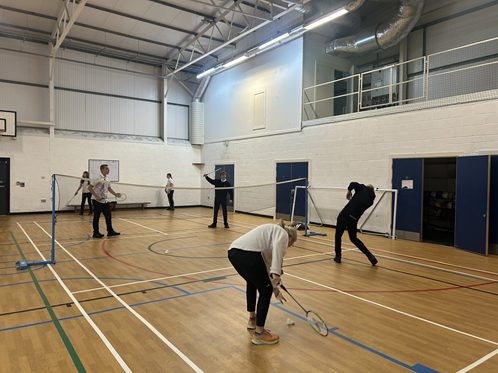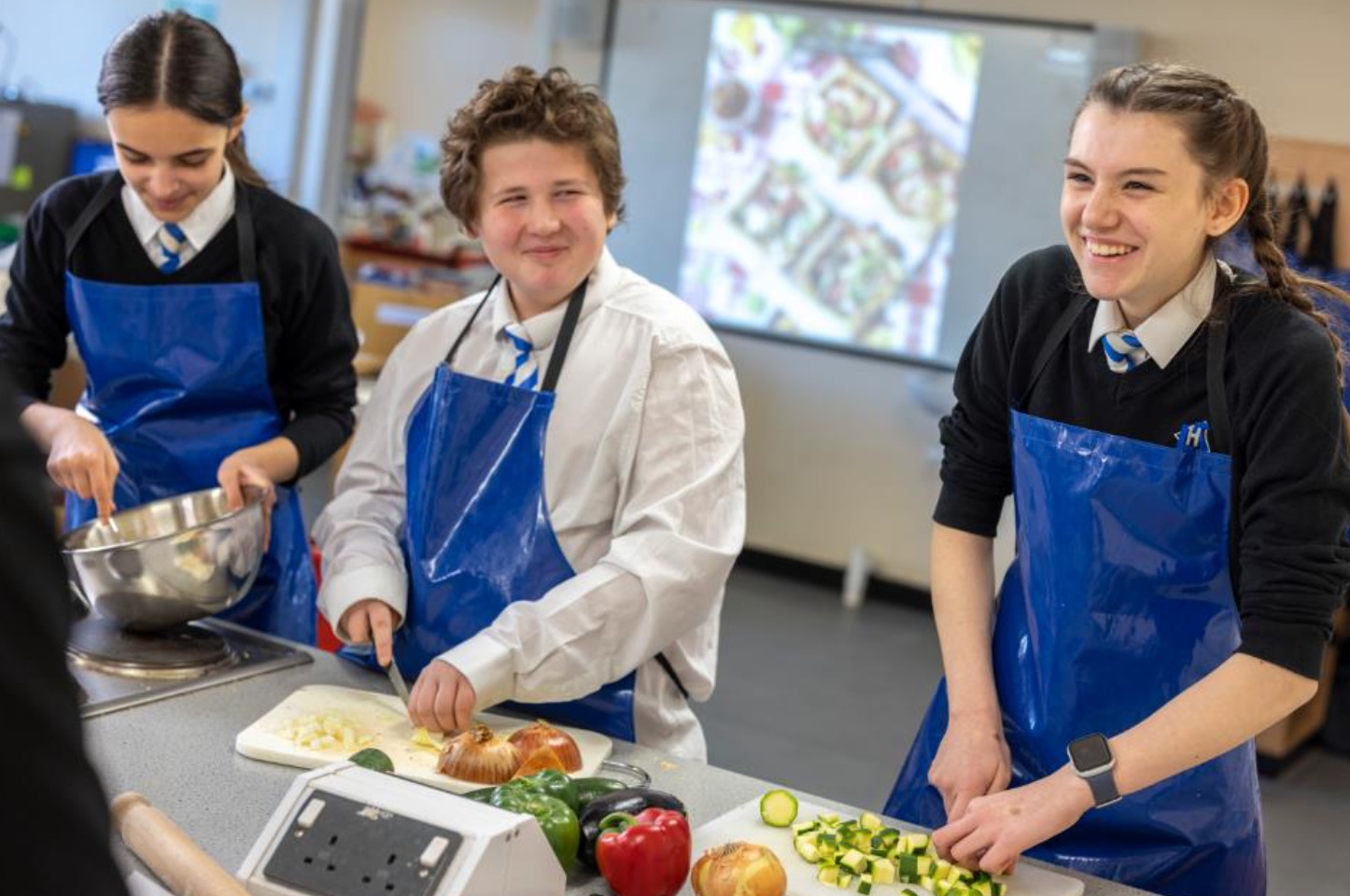19 September 2025
Dear Parents, Guardians and Students/Annwyl Rhieni, Gwarchodwyr a Myfyrwyr
Every Lesson Counts: The Importance of Attendance from Week One
And we’re back. We have now successfully completed one full cycle of our fortnight timetable and we’re getting back into routines.
However, hands up if setting last week’s alarm was a struggle? We get it. The first few weeks of term is always an adjustment. Maybe your summer was a series of leisurely lie-ins and living life at your own pace? Now, it’s morning routines, school bells and timetables again.
But getting up for school, and getting into class are so important.
It’s not just about tired eyes in the morning. Nationally, school attendance is a growing concern.
Just last week Education Secretary Bridget Phillipson said Department for Education (DfE) data showed overall absence fell in autumn 2024/25, but the number of pupils classed as ‘severely absent’ (missing over half of school days) rose from 142,000 to 148,000.
That’s the picture in England and in Wales we already know that good attendance is closely tied to opportunities and future quality of life.
So, we want to continue the conversation: to understand the challenges that our students face and find a way to get them back into the classroom and learning, together.

What’s the current state of play in secondary school attendance in Wales?
The good news; attendance is improving. However, six years on, attendance across Wales has still not recovered to pre-pandemic levels. In 2018/19 attendance averaged 94.3% and despite marginal improvements in 2023/24 overall school attendance in Wales (5-16 year olds) still only averaged 90.5%.
How does this compare to secondary schools figures?
- In 2023/24, secondary pupils missed 12% of half day sessions (slightly down from 12.5% in 2022/23, but nearly double 2018/19)
- 37.1% of secondary pupils were persistently absent (missing 10%+ of sessions)
- Year 11 had the highest absence rate at 45.2%
- Free School Meal (FSM) students missed 20.1% of sessions (compared with 9.8% for non-FSM), with 61.4% persistently absent
- Additional Learning Needs (ALN) and Special Educational Need (SEN) students missed 17.2% sessions (vs 11.2% for those without)
- Girls recorded slightly higher absences than boys (12.5% vs 11.5%).
Why the concern? If attendance rates are creeping back up and we’re only talking 3-4% difference, what’s the real impact to the classroom, to our learners and their futures?
What’s the impact of poor school attendance on attainment?
All the evidence suggests there is a direct, positive link between attendance and attainment. Research by the Department for Education (DfE) , allowing for socio-economic factors, found:
- Attendance gains at Key Stage 4 (KS4) impact GCSE results
- Moving up by one 5-point attendance band (e.g. 90-95% – 95-100%) significantly increased the likelihood of achieving Grade 5+ in English and Maths
- Even those at the other end of the scale, the most severely absent, benefited from an increase in the time spent in school
- Pupils increasing attendance from below 50% to 60-65% (equating to approximately an extra 4-6 weeks in school) were twice as likely to meet the standard expected.
However, Estyn has warned, despite recent improvements, it could take 10+ years for attendance rates to recover to pre-pandemic levels.

This is not a future problem, it is affecting our students, right now. Research from the Department for Education (DfE) shows the impact low attendance can have on academic attainment. And while in recent years, Estyn’s own analysis has focused on trends and persistent absence rates, in the past they have also found pupils who missed more school were far less likely to achieve GCSE benchmarks.
Only 4% of those missing more than half of sessions reach the expected standard: every percentage point of attendance makes a difference to future results.
If we already know every lesson counts, what’s stopping our students from achieving 95%+ attendance?
What are the reasons for school absences in Wales?
It’s easy to think absence is just about illness or a lack of motivation, but we understand the reality for many of our students is far more complex. Both the Estyn Report and our own student voice surveys highlight a wide range of challenges, preventing our students from attending school, regularly:
- Stress and Anxiety – there is a rising number of students reporting school-related anxiety, especially post-pandemic, with Estyn suggesting a ‘substantial increase’ in mental health challenges
- Poor Sleep – from our own research, tiredness was one of the most common reasons students gave for missing lessons. NHS guidance suggest teenagers need between 8-10 hours sleep but late nights, too much screen-time and poor routines are having an impact
- Relationships – difficulties with peers, strained teacher relationships and bullying are sometimes cited as reasons why students avoid going to school. Staying away can feel like the only option
- Financial Pressure – costs for uniforms, equipment and travel can be a challenge for many families. Getting to school isn’t always easily accessible or affordable
- Illness – illness remains the single biggest reason for low attendance. Furthermore, Estyn recognised an increase in parent/carer concern about their children attending school since the pandemic – with some children being kept off with even mild symptoms.
Absence is rarely just about one thing. For some it’s a mix of anxiety, friendship worries and poor sleep. For others it can be financial challenges or health related issues.
Behind every statistic is a real student, with their unique experience of school-life. But the outcome is the same – hours of learning lost.
When students miss school, they don’t just lose out on lesson time, they miss the opportunities to build confidence, communicate with classmates and teachers, get organised and meet deadlines; future life-skills.
So, what can we do to support our students and their families so they feel able to attend school and succeed, together?

How is LHS supporting student attendance?
We’ve been working hard to improve our post-pandemic attendance and are proud to say our whole school attendance rate is currently 91.3%. But we’re not done and have ambitions to increase that to 92.5% this academic year.
We know the challenges are real and that no two students face the same barriers. That’s why we’ve put a range of support in place to help every learner succeed.
- Building Routine
Missing the first week of term can lead to ‘persistent absences’ and good attendance starts with good sleep. Screen-free time before bed and consistent wake-up calls help set a regular routine leading to calmer more predictable mornings
- Normalising Nerves
First term nerves are normal but ongoing anxiety can’t be overlooked. Resources like the recently published guide from Cygnet Healthcare help identify signs of anxiety and provide practical strategies supporting you and your child. Whilst your child is in school our Wellbeing Centre provides a range of services and offers a quiet space. Open from 7:30AM, with a team on-site until 3:30PM, we work with the CAMHS Primary Mental Health In-Reach Team, Youth Mentors and Cardiff Safeguarding Team offering bespoke support to our pupils – for when everything can feel a little too much
- Tackling Financial Barriers
The cost-of-living crisis has impacted many in our community. We’ve introduced a number of measures to support our students and their families; from travel to school to our Blazer Exchange Programme. The Welsh Government also provides a grant to eligible families to help with the School Essentials; including uniforms and learning equipment. Applications are now open, closing 31st May 2026. Financial support can make a big difference to how your child experiences school. If you need any help in applying, please speak to reception
- Positive Relationships
While there is always a focus on engagement, high-quality and purposeful teaching we know the value of building a community at LHS. Beyond our Anti-Bullying Policy and reporting routes: through our Peer Mentor group and on-site Youth Worker, Jordan Edwards, we’re here to equip our students with the skills and resilience to cope with every-day school life; building a safe and inclusive environment for all.
Succeeding Together
We know there’s more work to be done. Improving attendance is all our responsibility and we need your help. This academic year we’ll be sharing initiatives, guidance and keeping the conversation going.

Talking with your child about the importance of their attendance can make a difference. From Week 1 to the end of the year – every lesson really does count.
Good attendance helps your child have a full school-life. From academic success to the confidence to make new friends. And remember attendance issues can escalate, so if you have any concerns please get in touch via reception – the sooner we know, the sooner we can help.
Our extra-curricular offer and our hidden curriculum
Our curriculum encompasses everything that we provide during the school day. For many of our students, the opportunity to join groups, clubs and activities allows them to be part of something unique and special and to develop a sense of identify and belonging. This, in turn, contributes to good attendance.
So let’s share just some of those opportunities, starting with the opportunity to find or unleash your inner musical being…..

Learning an instrument boosts creativity, sharpens memory, and strengthens focus whilst giving an enjoyable way to express yourself. It’s a lifelong skill that is proven to reduce stress and brings joy, whether you’re playing solo or sharing music with others.
Cardiff and the Vale Music Service provide excellent teachers who come in and teach in our practice rooms during the school day, and offer a range of lesson and price options.
If you would like enrol in instrument or vocal lessons at Llanishen please sign up at https://www.cfmusiceducation.co.uk/.
All of the Expressive Arts extra-curricular clubs start up from Tuesday 23rd September:
- Tuesday 2.45-3.45pm Junior Choir
- Tuesday 2.45-3.45pm Senior Choir
- Wednesday 2.45-3.45pm Drama Club
- Wednesday 2.45-3.45pm Orchestra
- Thursday 2.45-3.45pm Shakespeare Club
And the key dates for your diaries are…
- 17th and 18th December – Christmas Concert (WWH) 7pm
- 11th and 12th February – Shakespeare (Drama studio) 6pm
- 11th March – Cluster Eisteddfod (WWH) 4pm
- 26th March – Battle of the Bands (WWH) 6pm
- 7th, 8th and 9th July – Summer Production (WWH) 7pm
This could be you…..




LHS Shakespeare Players 2026
On Thursday 11th September, 23 students took part in auditions for 2026’s Shakespeare performance of Hamlet. An incredible turnout that keeps growing each year! Without further ado….we present the cast list for 2026 production of Hamlet that will be performed on the 11th and 12th of February 2026!
Hamlet – Jacob Parsons
Claudius – Ozzy Russell
Horatio– Emma Judd
Gertrude – Isla-Grace Martin
Ophelia – Eve Payne
Laertes – Jack Parker
Polonius – Jess Clayton
Rosencrantz– Savannah Winters
Guildenstern – Emilee Harp
King’s Ghost (voice) – Abigail Marshall
King’s Ghost – Grace Lee
Player 1 – Ruth Gattenburg
Player 2 – Eleanor Hopkins
Player 3 – Esme Martin
Player 4 – Tanya Saadallah
Player 5 – Faith Lydall
Gravedigger 1 – Hayden Watkins
Gravedigger 2 – Evan Coughlan
Marcellus – Ally Khan
Bernardo – Penny Smyth
Francisco – Charley Freedman
Reynaldo – Abigail Marshall
Voltemand– Imogen Davies
Cornelius – Lavinia Hughes
Cue a photograph of their 2025 production of the Merchant of Venice. Is this something that you would like to know more about? Mr Wolverson is the person to speak to.

When he’s not teaching Drama or rehearsing with the Shakespeare players, Mr Wolverson has teamed up with Mr Beck to nurture the next grand masters in our Chess Enrichment Club. The title currently stands with Bibisara Assaubayeva from Kazakhstan but that could change…


Along with this blog, we are also delighted to launch our full LHS Extra-Curricular timetable.
It comes in two sections. In the Subject section you will find all sorts of clubs from Drama, to orchestra, homework club, Welsh club, Art and Photography, D&D, Pokemon Club, and so much more.
In the winter sports section, you’ll be exhausted just reading the activities on offer. This offer is in addition to the many physical activities on offer through Enrichment. One of those is badminton. Mrs Harry and Miss Jenkins said it was ‘lush’ to see Year 13 students playing badminton with Year 7,8,9 and 10 students!


Learning Support Star of the Week
This week’s Learning Support SOTW is the fabulous Elliott Wyatt in Year 8.
Elliott has made a fantastic start to the new school year and has taken it all in his stride with a big smile on his face.

I have to agree. That smile goes everywhere with him!
Well done Elliott!
Staff Seren yr wythnos
Alongside the Learning Support SOTW we also have a new standing Blog item this year.
Each week, our student Criw Cymraeg group are nominating a member of staff for their use of the Welsh language. They can be nominated for their effort or their accuracy and pronunciation!
The staff Seren yr wythnos for this week, as voted by the Criw Cymraeg is …. Mr Prince.
The staff Seren yr wythnos for last week, as voted by the Criw Cymraeg was … Mr Pontin.
Well done both!
Extra-curricular timetable
Please enjoy the extra-curricular timetable that accompanies this blog and we look forward to bringing you more news and updates next week.
Thank you for reading/Diolch am ddarllen,
Mrs Sarah Parry, Headteacher
